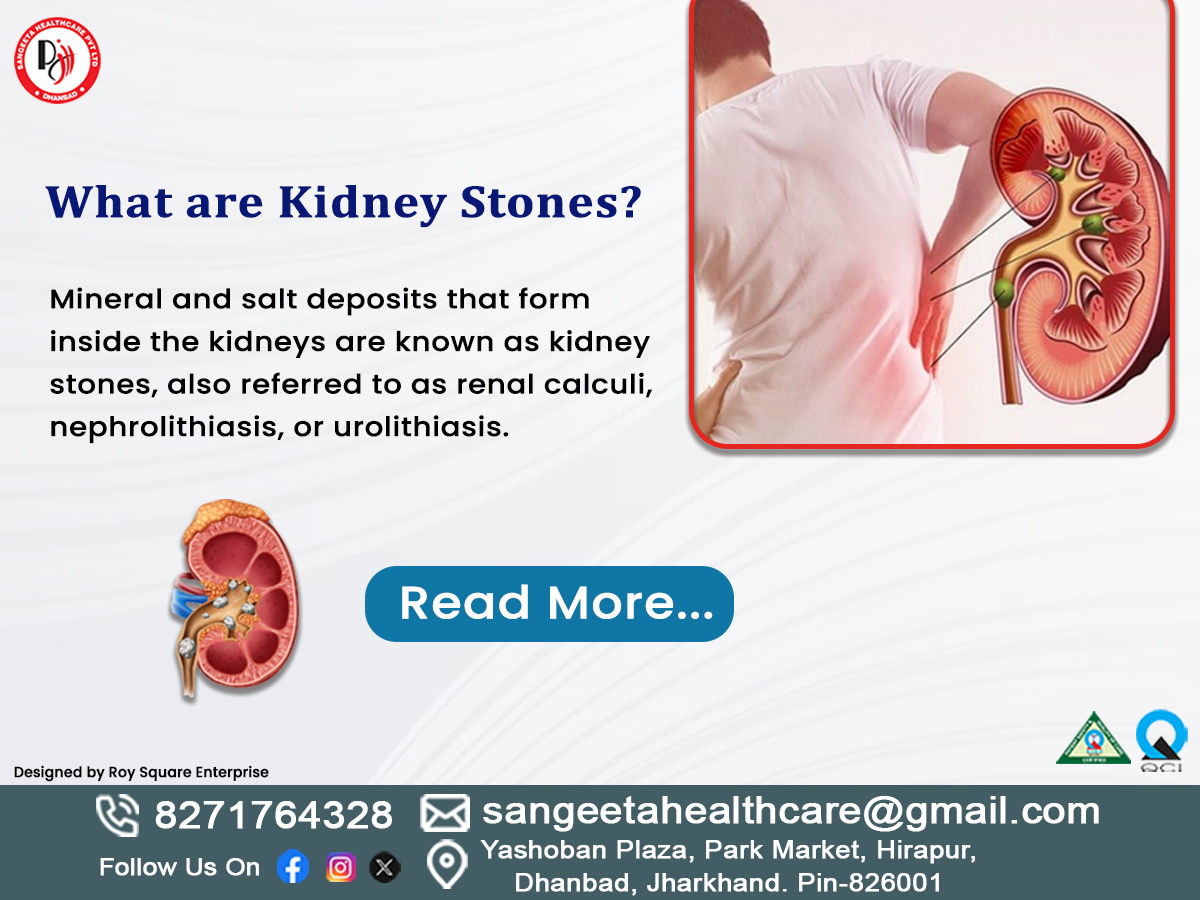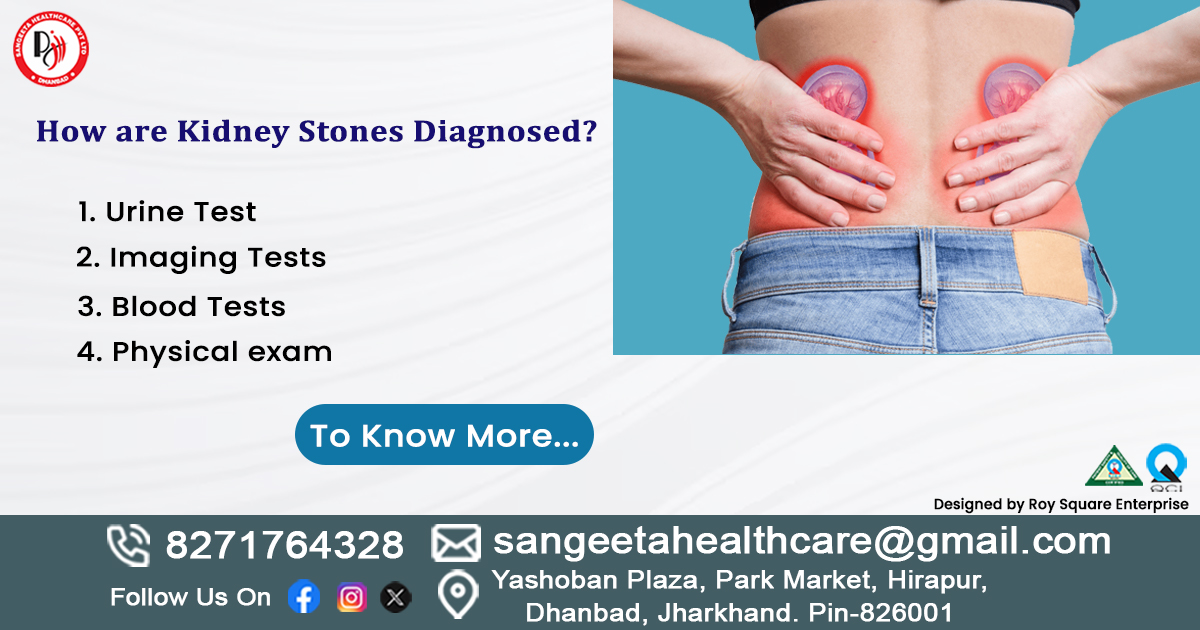Kidney Stones: Causes, symptoms, and treatment.

Mineral and salt deposits that form inside the kidneys are known as kidney stones, also referred to as renal calculi, nephrolithiasis, or urolithiasis. The formation of these hard deposits can be triggered by various factors like – dietary habits, excess body weight, pre-existing medical conditions, and the use of certain supplements or medications. These stones can develop anywhere along the urinary tract, from the kidneys to the bladder. Concentrated urine, which enables minerals to crystallize and bond, is a common underlying cause of kidney stone formation.
What are the symptoms of Kidney Stones?
Kidney stones often remain symptom-free until they move within the kidney or enter the ureters, which connect the kidneys and bladder. If a stone becomes stuck in the ureters, it can block urine flow, cause kidney swelling and trigger painful ureter spasms. At this point, symptoms may arise:
- Severe pain: Pain in your side and back, also below the ribs.
- Radiating pain: Pain that spreads to the lower abdomen and groin.
- Urination difficulties: You may feel irritation, burning sensation or pain while urinating.
Additional Signs and Symptoms
- Discoloured urine (pink, red, or brown)
- Cloudy or foul-smelling urine
- Frequent urination
- Nausea and vomiting tendency
- Fever and chills (In case of infection)
Types of Kidney Stones
Knowing the type of kidney stone you have is crucial in determining its cause and identifying ways to reduce your risk of getting more kidney stones. The four types of kidney stones include:
- Calcium Stones: There are several types of kidney stones, but the most common ones are calcium stones. These stones usually form in the shape of calcium oxalate. Oxalate is a substance produced by your liver or absorbed from your diet. Certain foods, such as fruits, vegetables, nuts, and chocolate, have high oxalate content.
Certain factors, including dietary habits, excessive vitamin D intake, intestinal bypass surgery, and various metabolic disorders, can elevate urinary calcium or oxalate levels, potentially leading to kidney stone formation, often in the form of calcium or calcium phosphate stones. Calcium phosphate stones are more prevalent among individuals with underlying metabolic conditions, such as renal tubular acidosis. Additionally, certain medications used to treat migraines or seizures, such as topiramate (Topamax, Trokendi XR, Qudexy XR), may also be associated with calcium phosphate stones.
- Uric Acid Stones: Uric acid stones can develop in individuals with specific conditions or dietary habits, including, Chronic diarrhea or malabsorption, high-protein diet, diabetes or metabolic syndrome. Additionally, certain genetic factors may also increase the risk of forming uric acid stones.
- Struvite Stones: Struvite Stones typically develop as a result of a urinary tract infection (UTI). They can grow rapidly, become large in size and often cause few symptoms.
- Cystine Stones: Cystine stones form in individuals with a hereditary disorder called cystinuria, which causes the kidneys to release excessive amounts of a specific amino acid, leading to stone formation.
What is the cause of Kidney Stones?
Kidney stones often result from a complex interplay of factors, rather than a single cause. The formation of kidney stones is influenced by certain substances in the urine. When the urine contains high levels of crystal-forming substances such as calcium, oxalate, and uric acid, it can increase the risk of kidney stone formation. Additionally, if the urine lacks substances that prevent crystals from sticking together, it can create an environment for the development of kidney stones.
Kidney Stone Risk Factors
Developing kidney stones can be influenced by various things. Here are some kidney stone risk factors are mentioned below:
- Family History: Having a family history of kidney stones increases your likelihood of developing more.
- Dehydration: Inadequate water intake can heighten your risk. People living in hot or dry climates or those who excessively sweat are more susceptible.
- Dietary Factors: Consuming a diet rich in Protein, Sodium (salt) or Sugar may elevate your risk, particularly for certain types of kidney stones. A high-sodium diet is especially concerning, as excessive salt increases calcium filtration by the kidneys, significantly raising the risk.
- Obesity: High body mass index (BMI), large waist and weight gain are linked to an increased risk.
- Digestive Issues and Surgery: Gastric bypass surgery, inflammatory bowel disease and chronic diarrhea can disrupt calcium and water absorption, increasing the risk of stone-forming substances in the urine.
- Other Medical Conditions: Certain conditions, such as Renal tubular acidosis, Cystinuria, Hyperparathyroidism, and Recurring urinary tract infections can also heighten your risk.
- Supplements and Medications: Certain substances, including Vitamin C, dietary supplements, excessive laxative use, calcium-based antacids, and specific medications for migraines or depression may increase the chances of kidney stones.
Complications of Kidney Stones
Untreated kidney stones can lead to several complications, including:
- Acute Pain: Passing kidney stones can cause debilitating pain in the back, abdomen, or groin area, affecting your daily lifestyle.
- Urinary Tract Infections (UTIs): Kidney stones make the environment for bacteria, which leads to Urinary Tract Infections (UTIs). Symptoms include frequent urination, a burning sensation during urination, and fever.
- Blockage of Urine Flow: Large kidney stones or those lodged in the urinary tract can block urine flow. It can cause severe pain, urinary retention, kidney damage or infection.
- Hydronephrosis: Kidney stone obstruction can lead to hydronephrosis, a condition characterized by kidney swelling due to urine buildup. Symptoms include back pain and potential kidney damage.
- Kidney Damage or Failure: Prolonged obstruction or kidney stone formation can damage kidneys, affecting their function over time. Chronic Kidney Disease (CKD) or kidney failure may occur in severe cases.
- Sepsis: Rarely, kidney stones can lead to sepsis, a life-threatening systemic infection. It requires immediate medical attention.
Kidney Stones Prevention
Here are some effective strategies that will help in your kidney stone prevention:
- Stay Hydrated: Drink an adequate amount of water throughout the day to maintain urine volume and prevent mineral concentration. At least 8-10 glasses of water daily you should drink.
- Maintain a Balanced Diet: Focus on fresh fruits, vegetables, and whole grains. Reduce your salt intake and balance your animal protein consumption.
- Manage Calcium: Calcium is important for our body and bones. However, calcium supplements can be harmful. Try to consume calcium through foods.
- Limit Oxalate-Rich Foods: Restrict foods high in oxalates (spinach, beets, nuts, chocolate, tea). Pair oxalate-rich foods with calcium-rich foods to reduce oxalate absorption.
- Reduce Sodium Intake: Limit processed and packaged food immediately. Try to consume fresh or whole foods.
How are Kidney Stones Diagnosed?
Kidney stones diagnosis relies on a combination of imaging, blood, and urine tests. If your provider suspects a kidney stone, they may recommend one or more of the following tests:

- Urine Test: A urine test can detect blood in the urine, stone-forming crystals, and signs of infection.
- Imaging Tests: These tests help visualize the size, shape, location, and number of stones. Imaging tests include X-rays, CT scans and Ultrasound.
- Blood Tests: Blood tests can evaluate kidney function, detect infections and identify high levels of calcium or other conditions that may contribute to stone formation.
How are Kidney Stones Treated?
Treatment of kidney stones depends on the size, location, and type of it. Your doctor may recommend one of the following treatments:
Treatment options for small stones with Minimal Symptoms
- Staying Hydrated: Drink 2-3 quarts (1.8-3.6 liters) of water daily to keep your urine dilute and prevent stone formation. Aim for clear or nearly clear urine.
- Pain Relief: For mild pain, your doctor may recommend pain relievers like ibuprofen (Advil, Motrin IB) or naproxen sodium (Aleve).
- Medical Therapy: Your doctor may prescribe an alpha-blocker to help pass the kidney stone. It relax ureter muscles, making it easier to pass the stone with less pain. Alpha-blockers include medications such as tamsulosin (Flomax) and the combination therapy dutasteride/tamsulosin (Jalyn).
Treatment options for large stones with problematic symptoms
-
Extracorporeal Shock Wave Lithotripsy (ESWL)
ESWL uses sound waves to break up stones into small pieces that can be passed through your urine. This procedure lasts 45-60 minutes and may require sedation or light anesthesia. It can cause moderate pain, blood in urine or discomfort.
-
Percutaneous Nephrolithotomy (PCNL)
PCNL is a surgical procedure to remove large kidney stones. It involves making a small incision in your back, and inserting telescopes and instruments to remove the stone. It requires general anesthesia and 1or 2 day hospital stay.
-
Surgery with a Ureteroscope
Ureteroscopy uses a thin, lighted tube (ureteroscope) to remove smaller stones in the ureter or kidney. The procedure involves passing the ureteroscope through your urethra and bladder. This is performed under general or local anesthesia.
-
Parathyroid gland surgery
In some cases, calcium phosphate kidney stones are caused by overactive parathyroid glands. Located near the thyroid gland, these four glands regulate calcium levels in the blood. When the parathyroid glands produce excess parathyroid hormone (hyperparathyroidism), calcium levels become elevated, leading to kidney stone formation. This condition can occur due to a small, benign tumor on one of the parathyroid glands. Removing the growth or tumor from the affected gland can prevent further kidney stone formation.
FAQ: Frequently Asked Questions
- What are Kidney Stones?
Answer: Mineral and salt deposits that form inside the kidneys are known as kidney stones, also referred to as renal calculi, nephrolithiasis, or urolithiasis.
- What are the symptoms of kidney stones?
Answer: Symptoms of kidney stones can include, severe pain in the side or back, pain that radiates to the lower abdomen, nausea and vomiting, frequent or painful urination, and discoloured urine.
- Can Kidney Stones be prevented?
Answer: Yes, kidney stones can be prevented by drinking plenty of fluids, eating a balanced diet low in animal protein, sodium, and sugar and through maintaining a healthy weight.
- How are kidney stones treated?
Answer: Treatment for kidney stones depends on the size and location of the stone. Small stones may pass on their own with plenty of fluids and pain medication. Larger stones may require, Extracorporeal shock wave lithotripsy (ESWL) to break up the stone, Surgery to remove the stone (PCNL) & Removal of the stones using a small scope.


